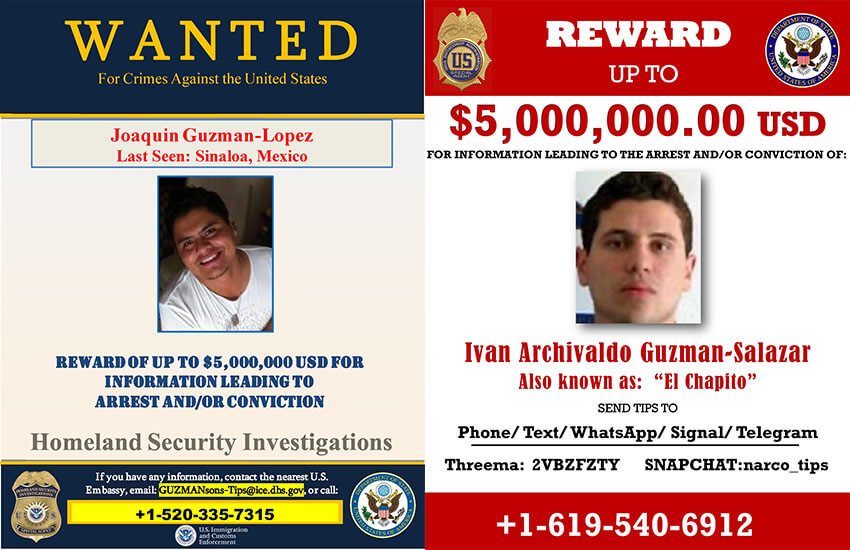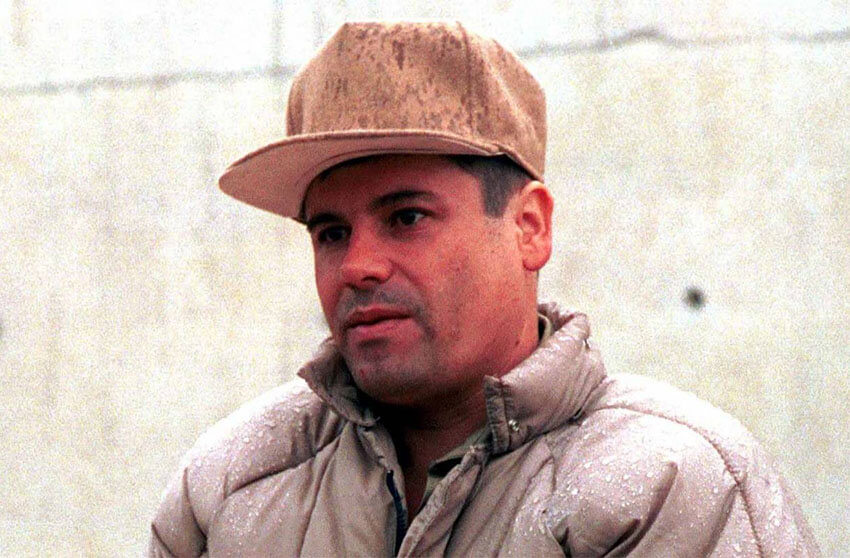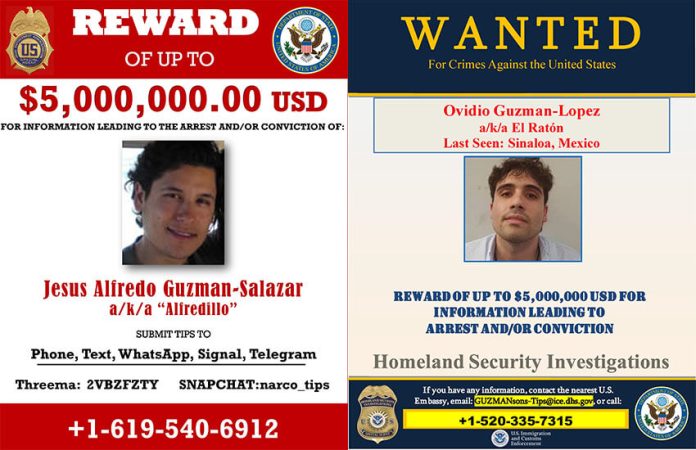The U.S. Department of State has released wanted posters for the four sons of jailed drug lord Joaquín “El Chapo” Guzmán Loera.
The posters were published online on Thursday, one day after the State Department announced rewards of up to US $5 million each for information leading to the arrest and/or conviction of Iván Archivaldo Guzmán Salazar, Jesús Alfredo Guzmán Salazar, Joaquín Guzmán López and Ovidio Guzmán López, also known as Los Chapitos.
The four men, all in their 30s, are high-ranking members of the Sinaloa Cartel and subject to federal indictments in the United States for their involvement in the illicit drug trade, the State Department said.
The eldest brother is Iván Archivaldo, who first appeared in the news after the 2004 death of Canadian student Kristen Deyell in Guadalajara. She and a man named César Pulido were shot and killed after leaving a nightclub together in the Jalisco capital.
Iván Archivaldo, also known as “El Chapito,” was the prime suspect and spent time in jail as he fought the murder charges as well as money laundering and organized crime allegations. He was released in 2008 and the murders of Deyell and Pulido officially remain unsolved.

The State Department said investigations indicate that Iván Archivaldo and the second eldest brother, Jesús Alfredo, aka “Alfredillo,” provided “significant operational assistance” to their father in his drug trafficking activities.
It said the assistance included coordinating the transport of narcotics from Central and South America to Mexico, coordinating the transport of narcotics into the United States, distributing drugs to wholesale customers in the U.S. and collecting drug proceeds from customers in the U.S. for transfer to Mexico for the benefit of Sinaloa Cartel members and associates.
The State Department said that Iván Archivaldo and Jesús Alfredo have used a variety of tactics to protect their interests including obtaining guns and other weapons, bribing corrupt public officials, engaging in violence and threats of violence and kidnapping, and intimidating members of law enforcement, rival drug traffickers, and members of their own drug trafficking organizations.
After El Chapo’s arrest, extradition to the United States and conviction in a New York court, Iván and Jesús increased their power within the Sinaloa Cartel, it said.
“They have expanded their enterprise with sophisticated fentanyl laboratories in Culiacán … and expanded their transportation operations utilizing maritime and air transportation in addition to tunnels and border crossings,” the State Department said.

The third eldest brother is Joaquín, aka “El Güero,” “Moreno” and “Güero Moreno.”
The State Department said that investigations indicate that Joaquín and the youngest brother, Ovidio, aka “El Ratón” and “El Nuevo Ratón,” operate their own drug trafficking organization, the Guzmán López Transnational Criminal Organization, under the umbrella of the Sinaloa Cartel.
“The Guzmán López brothers began their narcotics trafficking careers early by inheriting relationships from their deceased brother, Édgar Guzmán López. Following Edgar’s death, Joaquín and Ovidio inherited a great deal of the narcotics proceeds and began investing large amounts of the cash into the purchasing of marijuana in Mexico and cocaine in Colombia,” the State Department said.
“They also began purchasing large amounts of ephedrine from Argentina and arranged for the smuggling of the product into Mexico as they began to experiment with methamphetamine production.”
The State Department also said that the two brothers are currently overseeing about 11 methamphetamine labs in Sinaloa, where an estimated 1,360-2,267 kilograms of meth are produced per month. The drugs are sold wholesale to other Sinaloa Cartel members and to distributors in the United States and Canada, it said.
Ovidio is believed to have ordered the murders of informants, a drug trafficker, and a popular Mexican singer who refused to sing at his wedding.
He was captured in Culiacán in October 2019 but was promptly let go to avoid a bloodbath in the Sinaloa capital. President López Obrador reiterated Thursday that he personally ordered his release.
He told his regular news conference that the arrest of each of the Guzmán brothers is a priority for his government and that if they are in Mexico their detention is the responsibility of Mexican authorities.
“If they are in national territory it’s up to our authorities to detain them, no foreign force is allowed to act on these matters,” López Obrador said, adding that his administration won’t tolerate impunity for any criminals.
With regard to the events in Culiacán in October 2019 – referred to colloquially as the Culiacanazo – the president said that 200 people could have died if Ovidio wasn’t released.
“… There was going to be a confrontation with a lot of deaths and we didn’t want there to be more deaths. There was a calculation that 200 people could lose their lives. It will be history [that decides whether] we did the right thing or the wrong thing; I made the decision,” López Obrador said.
